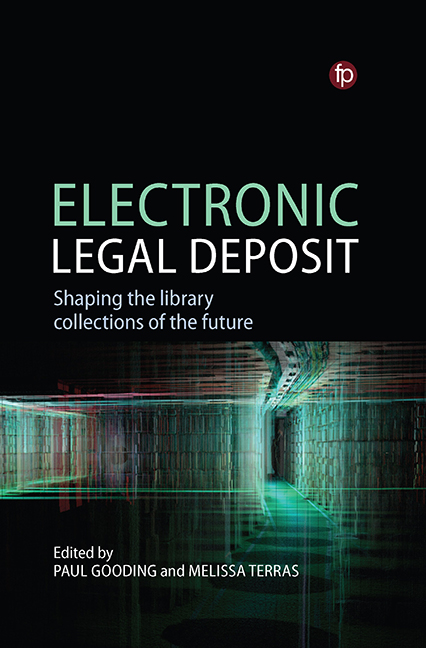Book contents
- Frontmatter
- Dedication
- Contents
- Figures and Tables
- Contributors
- Foreword
- Introduction
- PART 1 INSTITUTIONS AND IMPLEMENTATION
- 1 UK Non-Print Legal Deposit: From Regulations to Review
- 2 The Influence of Legal Deposit Legislation on the Digital Collections of the National Library Of Scotland
- 3 E-legal Deposit at the Biblioteca Nacional de México (National Library of Mexico)
- 4 Bibliographic Control in Zimbabwe: the Conundrum of Legal Deposit in the age of Digital Technologies
- 5 Electronic Legal Deposit in Sweden: the Evolution of Digital Publications and Legislative Systems
- PART 2 USERS AND CONTEXTS
- 6 Publishers, Legal Deposit and the Changing Publishing Environment
- 7 Making History: Digital Preservation and Electronic Legal Deposit in the Second Quarter of the 21st Century
- 8 Giving with one Click, Taking with the Other: Electronic Legal Deposit, Web Archives and Researcher Access
- 9 Follow the Users: Assessing UK non-print Legal Deposit within the Academic Discovery Environment
- 10 ‘An Ark to Save Learning from Deluge’? Reconceptualising Legal Deposit After the Digital Turn
- Index
2 - The Influence of Legal Deposit Legislation on the Digital Collections of the National Library Of Scotland
Published online by Cambridge University Press: 07 November 2020
- Frontmatter
- Dedication
- Contents
- Figures and Tables
- Contributors
- Foreword
- Introduction
- PART 1 INSTITUTIONS AND IMPLEMENTATION
- 1 UK Non-Print Legal Deposit: From Regulations to Review
- 2 The Influence of Legal Deposit Legislation on the Digital Collections of the National Library Of Scotland
- 3 E-legal Deposit at the Biblioteca Nacional de México (National Library of Mexico)
- 4 Bibliographic Control in Zimbabwe: the Conundrum of Legal Deposit in the age of Digital Technologies
- 5 Electronic Legal Deposit in Sweden: the Evolution of Digital Publications and Legislative Systems
- PART 2 USERS AND CONTEXTS
- 6 Publishers, Legal Deposit and the Changing Publishing Environment
- 7 Making History: Digital Preservation and Electronic Legal Deposit in the Second Quarter of the 21st Century
- 8 Giving with one Click, Taking with the Other: Electronic Legal Deposit, Web Archives and Researcher Access
- 9 Follow the Users: Assessing UK non-print Legal Deposit within the Academic Discovery Environment
- 10 ‘An Ark to Save Learning from Deluge’? Reconceptualising Legal Deposit After the Digital Turn
- Index
Summary
The National Library of Scotland, with its centres in Edinburgh and Glasgow, is one of six legal deposit libraries in the United Kingdom and Ireland tasked with responsibility for collecting British published print and non-print resources under the Legal Deposit Libraries Act 2003 and the Legal Deposit Libraries (Non-Print Works) Regulations 2013. In this chapter we give an overview of the history of the National Library of Scotland, and the growing importance and scale of its digital collections, while contextualising the challenges to access and format that come with operating in this space. Pressing issues include considerations of how to widen access to the Library's digital collections and the UK Web Archive, in a legal framework that prioritises access conditions best suited to print. The Library is also grappling with digital preservation issues regarding how best to ingest, safeguard and provide access to structured datasets such as maps, e-books, interactive fiction, and new and evolving media. This chapter outlines the growing digital expertise within the UK's legal deposit libraries, and demonstrates the agile approach that is necessary to ensure that the current, ever-changing UK publishing environment is safeguarded and available for current and future generations to consult.
Context and history
The legal deposit collections of the National Library of Scotland have their foundations in The Advocates Library of the Faculty of Advocates. The Advocates Library was formally inaugurated in 1689, although the Faculty had long been collecting texts and other documents to support legal practice (Solberg, 1938). The Copyright Act of 1710 entitled the Keeper of the Advocates Library to claim a copy of every book published in the British Isles, the first form of legal deposit, thereby broadening the scope of the Faculty's collection beyond legal materials. As a result of the Act, The Advocates Library became Scotland's national library in all but name. By the beginning of the 20th century the ever-growing collection of legal deposit materials was proving challenging for the Faculty, a private members’ organisation, to store and maintain. In seeking a solution it approached the UK government for support.
- Type
- Chapter
- Information
- Electronic Legal DepositShaping the Library Collections of the Future, pp. 33 - 56Publisher: FacetPrint publication year: 2019



